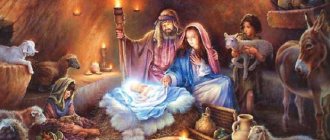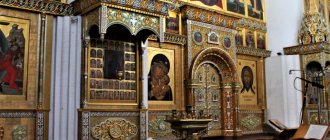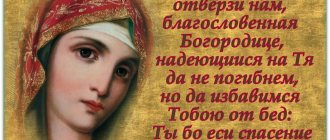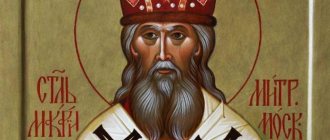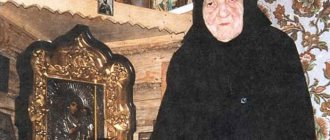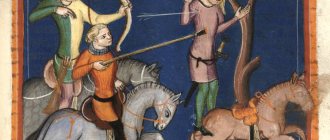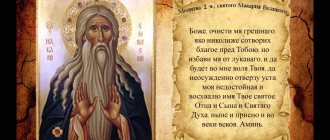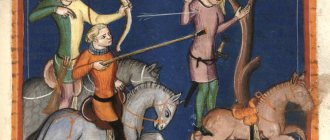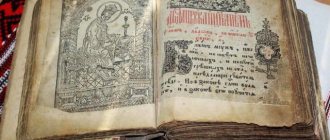Christmas can be called the beginning, one of the main Christian holidays. The Holy Church and the entire Orthodox world glorify the great event - the Divine appearance on earth of Jesus Christ. Everywhere there is joy, celebration, Christmas trees sparkling with elegant toys, gifts and treats.
This is a bright holiday, because salvation has come to earth. And if anyone is lucky enough to be in church on this holy night and hear the jubilant hymn “Thy Nativity, Christ our God,” then the memories will last for a long time.
Troparion of Your Nativity, Christ our God
This is one of the main chants of celebration, relating to the great twelve most significant Christian holidays.
Among them:
- Christmas;
- Epiphany;
- Candlemas;
- Palm Sunday;
- Trinity Day and others.
The words troparion (τροπάριον) are taken from the Greek language. It means tone, melody or mode and refers to the oldest type of church singing, dating back to the 4th century. Previously, they were called musical works of worship, and they were then performed not in poetry, but in prose in a certain rhythm.
The festive troparion is always performed together with the kontakion. They are small, short main choral prayers, always sounded together, in pairs. But the first, as a rule, sounds in the form of a song, and the second - a poem. They were made laconic in order not to overload the service, and so that all parishioners, regardless of education, could remember and sing them
The Christmas holiday, filled with many unforgettable impressions, cannot be imagined without a church, without the majestic service of the All-Night Vigil and, of course, the main hymn of the celebration of the 4th tone.
What is the troparion of the Nativity
If we recall Christian hymnography, its development began precisely with the troparion - a short church chant that reveals the essence of the holiday or glorifies the saint(s). It resembles a spring compressed to the limit, concentrating in itself the maximum meaning and emotional content. At the same time, each praying person, due to his spiritual and mental development, releases from prayer as much as he can perceive.
The prayer “Thy Nativity, O Christ our God” speaks of man’s knowledge of God as the Source of life, light and righteousness. The troparion completes the cycle of evening songs, performed more and more meaningfully, uplifted, and its very name indicates a special complexity and melodic richness.
In each voice, the troparary melody is the basis of all others. It can only be compared to a prokymne. Therefore, it is the troparion that occupies the most honorable place among other hymns at all services, opening their series: at matins and evening services or replacing other prayers (liturgy and at the hours, and together with kontakion).
Why do they read?
The troparion of the forefeast contains great significance. With the Incarnation, the deep secret of humanity was revealed, without which the meaning of earthly life does not exist. The coming of Christ into the world separated the ancient world from the new.
Incredibly, the true depth, grandeur and mysterious meaning of the holiday are combined in one short work. The more people begin to reflect on what they heard and saw in the temple, reading prayers at home, the more obvious the answer and meaning of the celebrated event will become.
The Christmas troparion always poses large and mysterious themes for the thinking performer. And every time you have to think anew, discover them in a new way and constantly make your choice: with whom to be? With those who love and serve Christ, those who are indifferent, or those who are openly hostile to Him?
Structure (into what parts is it divided)
Despite its small volume, several phrases (parts) can be distinguished in the anthem.
This:
- Your Nativity, Christ our God, is an appeal to the born Baby as to God.
- The rise of the world and the light of reason - it shone and gave the world the light of Divine knowledge, on which the salvation of the human soul depends.
- In it, those serving the stars studied with the stars - thanks to this light, the Magi serving the stars received knowledge from the new star.
- Let's go to worship the born king - the Sun of Truth, who enlightened people with the knowledge of the truth.
- We were able to see and know the Rising Sun from the heights of the East, that is, descended from heaven to earth.
- Lord, glory to You! Praise be to the Creator.
CHRISTMAS
“Today the virgin gives birth to the Most Essential and the earth brings a den to the untouchable. Angels and shepherds praise. The Volsvi travel with the star. For our sake, the Eternal God was born as a young boy.” Such a kontakion is sung on the feast of the Nativity* of Christ in the Russian Church. In this highly solemn holiday, the meaning of all Christian teaching is concentrated into focus. And since we are Christians, this is the essence of our destiny. But we are not just some abstract “Christians” living in an unknown time, in an unknown place. We are Russian Christians living in contemporary Russia. In order to be conscious participants in our destiny, we must understand for ourselves where we live, how we live and how we relate to the moment and place of the greatest event in the history of mankind - the Birth of Christ. This raises the question of the Orthodox understanding of space and time and the relationship of this understanding with our place and our time. So, our kontakion begins with the words “Virgin today.” “Virgin” is the adjective “virgin”, that is, the Virgin Mary (previously, Russians usually put the emphasis on the first syllable in this name - “Marya”, “Mary”, with the emphasis on the second syllable distinguishes the Mother of God from other Virgin Marys). “Today” means “today”, “on this day”, “on this day”. What does this “today,” “the day of the Birth of Christ” mean for us? If we approach from a secular position, that is, if we do not believe in what the Church teaches and, accordingly, if we do not believe in God, in the reality of His existence and His power, then this “today” has a historical and symbolic meaning, and The holiday itself has the character of a memory. That is, “today” (“today”), January 7, 2022, we commemorate an event that occurred 2022 ago. But for believers this is not the case. For believers, God stands above time, and everything that is connected with Him is not measured by temporary human measures. In the Church and for believers, the “today” of the given kontakion is precisely “today,” “now,” January 7, 2022. Not as a metaphor, but as reality. The event of the Nativity of Christ is happening now, “today.” Christ is born at this moment and radically changes the fate of the world, the fate of nations, our fate. In the “day”, two times collide with each other - everyday time and the time of eternity, eternity bursts into time, changes it, turns it into something else - into a magical moment that changes all the proportions and certainties of existence. In the magical Christmas time, existence is cut by the lightning of the Divine presence. This cutting did not happen some time ago (and now we seem to remember it) - if we believe, then it is happening now. This is what “today” refers to. “Today the virgin gives birth to the Most Essential.” The Pre-Essential is the One who was when there was no existing, the One who precedes existence. Time arises along with existence, as one of its most important dimensions. But the All-Essential is outside of time, since it presupposes existence, and yet the kontakion tells us - the All-Essential, God himself, is born precisely “today,” now. This means that there is such a “now”, such a “today”, which is capable of containing within itself That which is timeless. This is the greatness of the Good News - it tells us that something unprecedented, unheard of, impossible has happened, collapsing all philosophical constructs, all the arguments of ordinary common sense. From the point of view of common sense, from the point of view of the “wisdom of the world,” this is some kind of “madness.” Therefore, the holy Apostle Paul says: “Has God not turned the wisdom of this world into foolishness? For since the world through its wisdom did not know God in the wisdom of God, it pleased God through the foolishness of preaching to save those who believe” (1 Cor. 1:20-21). Now for us, specifically for you and me, who are in this temporary moment of January 7, 2022, what is more important: common sense, helpfully suggesting that we are talking about sublime allegories and beautiful metaphors, or the fact of a direct faith that rejects all opposing arguments of faith? The answer depends on whether we believe in God, whether we are Christians. It all comes down to this “today,” to how we are ready to understand Him, how we are ready to accept Him. If we cross the mind, then we open a new dimension in time - the dimension of the Essential, the dimension of Events, the Christmas dimension. From the attitude towards this “today” everything can be said about us. Not only about each individual, but about the people, about culture, about civilization, about the country, about society. If we have a Christmas dimension, we are one. If not, and this is a formal tribute to a recently rediscovered cultural convention, then another. The second means that we are not Christians, that we are not an Orthodox people and not an Orthodox society. The first means that we are in the center of the greatest of miracles, eclipsing all possible miracles. This is where we come to the “ground”. “The Earth brings a den to the Untouchable.” A nativity scene is a cave, that is, a hole, a hole in a rock, a mountain, a depression. The earth opens up and makes room in its dense structure for the Most Essential and Inviolable to manifest itself in it. Now this is a miracle of place, space. God is inviolable because He is above all the corporeal forms of the world, above space. But by His mercy He becomes voluntarily “touched” and is born on earth, in our world. In order to receive Him, the earth must provide space. Of course, according to common sense, this would be an infinitely large place, and not some kind of cave. And according to our faith, the cave was small, modest, capable of containing only the Infant God, the Most Pure Mother, Joseph the Righteous, and even a manger, a donkey and an ox... To contain the Inconceivable One, the great abyss would not be enough. Yes, and it would not have accommodated Him, but Orthodoxy teaches us that the cave is enough. But there must be a cave - the earth must move, it must make room - the most important place in the history of the world, the most important place in space. Now the question is: where is this land that “brings a den to the Untouchable?” You say: in Bethlehem of Judea, called the “House of Bread.” But where is the House of Bread? And again the watershed line: for those for whom “today” means “then,” “long ago,” “earth” means “another land,” “distant land,” “that land.” And accordingly, the question of her “bringing”, preparing, emptying the cave is a question for her. But for true believers it’s not like that. This land is our land, Russian land. If time has collapsed to the holy blessed night of the Nativity of Christ, to the incorporation of the Most Essential into the “day,” then another miracle, another magic happens—the “land of the faithful,” Christ’s land, the Russian land, our land must bring a den to the Inviolable One. That is, our earth must part, move, try to free up a holy place for the presence of the Lord. This is a Russian nativity scene that cannot be there, but must be here. This is a liberated Russian place for the Nativity of Christ, a place that must be prepared - opened, cultivated, created - by us. A den - a cave - is a dedicated place, it is not cluttered. Christ is born on earth, where there is a free place, where there is a space that is not yet clogged with meaningless everyday life, and if it is clogged, it is cleared for the great moment. Let it be small and simple, but it must be pure and prepared. This cave is the souls of the Russian people, these are our Churches, where people flock to celebrate Christmas. Isn’t Russia the “House of Bread”, isn’t almost our entire history consisting of the labor effort to grow bread? "Peasant" comes from "Christian". The one who grows bread from century to century, creates the “House of Bread”, builds Russian Bethlehem, makes the Russian Land worthy of Christmas. Makes it Christmas land. This is a magical land that is “here”. True, it will be “here” and not “there” if we are real Russians, real Russian Orthodox Christians... And how should we treat this Christmas land, our country, our open spaces, ours with the thought of Christ? place? Is this how we feel about it? On this earth at the moment of Christmas, meanwhile, “angels and shepherds” converge to “glorify” the “greatness of the miracle.” The highest spirits of God, the “lights”, are with the simplest shepherds standing on the night watch. The highest connects with the lowest at the Christmas point. Both angels and shepherds sing of the “intelligent light” that surpasses all reason. And the shepherds rush to the den to marvel at the miracle of miracles - the birth of God. Who are angels? Obviously not us, but sometimes a Russian person feels the trajectories of their rapid flights piercingly and acutely, we just have to turn away from what is around us, close our eyes to open other eyes - eyes looking in a different direction, inside. But we too can be shepherds—shepherds. In the event that we stand guard when everyone is sleeping. Only those who do not sleep when everyone else is sleeping can expect to find themselves on earth in the vicinity of Bethlehem on the blessed night, the holiest of all nights. And now, perhaps, the most important thing. “Wolves travel with a star.” Who are these Magi? These are Persian magicians. But magicians with their gifts - gold, incense, myrrh - are part of a magical place and a magical time. This means that they are “Persian” only if Christmas for us is a memory of the past, and not a real Event. It is important here that we are talking about the Russian word “magi”. The Persians did not know the Scriptures and were not under the law. But they were the first to come to worship the God-Man in His incarnation. Not Jews, but Persians. Not those who are in the law, but those who are outside the law. They come to Bethlehem from afar, from outside. In Judea itself, the ruler Herod, on the contrary, is far from happy about the Birth of the Savior and is preparing to slaughter all the first-born sons born that night. “Blessed is he who takes and dashes your babies against a stone!” (Psalm 136:9). Those near and in law are preparing to break the heads of their babies, those far away are going to worship the baby God. Zoroastrian magicians waited for their “savior” - Saoshyant, and worshiped fire. But at the decisive moment they made the most important choice: they believed in the true Savior of the world, preferring the radiance of the Essential Light to fire. There is the wisdom of those who are far from the law, from the true Faith, but who are waiting - truly, stubbornly, fiery - for the truth and the hour comes when he needs to get ready for the journey. Russian Magi collect their gifts - here and now, in order to come to a blessed point at a blessed moment. The path of the Magi is the path of Russia, the Russian people, the people who are waiting all the time. He waits calmly, gloomily, persistently, concentratedly, he waits even when there is nothing to wait for, when waiting is stupid and pointless, when he needs to break down and give up the whole thing... And he waits. For centuries, in circles, endlessly stretching our time. But the moment will come when in the East (note: in the East - not in the West, Satan has fallen in the West, from there comes only the electric flicker of St. Elmo’s wandering swamp fires) a star will light up. The star as a sign to the Russian Magi, as the fulfillment of Russian expectations. This means it's time for us to get ready to go. Where? - To Bethlehem, to the Bethlehem den. When? - “Today”, “today”, “now”. So what can we bring? - Gold clearly needs to be looked for somewhere else, and in the last centuries of our history we replaced sacred incense with some other substances and substances, other smells and mixtures - we smell not of incense, but of oil, often fumes or - what is even nastier - deodorant or lotion. But still, everyone has their own contribution, their own tiny treasure. The Russian man still has a heart left. This is what should be given away. So that he doesn't exist anymore. Give it to the newborn Christ, our God, and continue to live without a heart, let it be better in His tiny baby palms. Now about the Russian star. A star is a bright point in the night, a hole in the darkness of the vault. A small clot of living light. This is our heart. “Wolves travel with a star” - we go, led by the light of the Russian heart - one for all, which we will give, bring as a gift. Here you may get the impression that this will happen sometime later. But the fact of the matter is that the Persian magicians, expecting that salvation will come “sometime later” according to their fire-worshipping ideas, at one moment understand that “tomorrow” has come, that the future is now the present, that it has come true. And then the star of the heart flashes on the black horizon, and they set off on their journey. Their task (our task) is to arrive on time. That is, exactly at midnight on January 7, 2022. And here is the end of the kontakion - “for our sake, the Eternal God was born as a young boy.” God is born for our sake. Not by Himself, not because of Himself. Because of us. And again, not because of some abstract “us”, for the sake of the Russians. Of course, not only for the sake of Russians, all Russians. But for us, everyone is Russian. These are all concrete, not abstract. Let no one be offended, but rather go to Bethlehem, travel with the star and glorify the Nativity of Christ. There we will meet, but only “there” when this there completely becomes “here”, when we are transformed in Christmas time and Christmas space. Then the words of the Gospel will sound in all languages. This will be a translation from our language - if our language is truly Christian and Orthodox, if we ourselves are the people of Christ, and our country is the lot of the Blessed Virgin. “For our sake” cannot fit in, it’s too much. But in the Nativity of Christ everything is too much - the Eternal is born, the Inviolable One finds himself in a simple manger, the highest heavenly spirits stand on a par with the shepherds, the Virgin gives birth and feeds a baby wrapped in swaddling clothes, who - “from a young age” - is the Eternal God. Everything is incredible, everything is magical, everything is beyond the horizon of a healthy mind. In one of Dostoevsky’s letters there is a theme that was later repeated in The Brothers Karamazov: “If it were mathematically proven to you that the truth is outside of Christ, then you would agree to remain with Christ rather than with the truth.” We have heard a lot about such mathematical proofs, and almost all of us have repeated them for almost a century. If the truth is against Christ and the miracle of His Birth, then don’t care about the truth. Such truth is worthless; it is, in a word, not Russian truth. Russian truth is a controversial truth, the truth of what cannot be, but is. Moreover, the only thing that exists. To be on the side of the Nativity of Christ at the moment of the Nativity of Christ: this is the choice that the Russian people make / have made / will make. Otherwise, not only will it not exist, but it does not exist and never existed. Russians are against the truth, if the truth is not Christmas, not Christ’s. And even Russians without Christ are not Russians, like some “leftists”, some I don’t understand who... Happy Birth of Christ! For “for our sake, the Eternal God was born as a young child.” * The spelling and pronunciation of the word “Christmas” differs in ancient Russian and modern traditions. As Priest John Sevastyanov, rector of the Old Believer church in Rostov-on-Don, notes: “Rozhestvo is a Church Slavonic tradition of writing this word. Among the Old Believers there is a certain tendency to preserve just such a transcription.”
Troparion text
Your Nativity, Christ our God, illuminated the world with the light of knowledge, for through it those who served the stars were taught to worship You, the Sun of Truth, and to know You, from the heights of the Rising Luminary. Lord, glory to You!
Interpretation
The main purpose of the small work is to explain the meaning of the holiday. The idea is to show that the Nativity of Christ was a light to the world and to humanity mired in sins. For the sake of our salvation, blessed and eternal life, His Son came to earth more than two thousand years ago.
The troparion is characterized by three main parts. The first part is contained in the first two lines, similar to each other in melody and stress placement (in the same places, with the same number of syllables), which is typical for the Greek text. The next four lines (the middle part) are the exact opposite. This is a development of a theme reminiscent of a trope. Speaking of eventfulness, its beginning is a statement of the situation, the following lines are an analysis of what happened, and the end is the final stanza.
If we let the light of the beautiful Sun into our soul, we feel how the darkness leaves from there, our thoughts are put in order and the path to salvation becomes clear.
Christ gives the confused modern man the opportunity to choose the right path to eternal life, replacing the wrong road with the right one.
Based on what has been said, upon careful reading of the initial words of the troparion, an understanding of the true meaning of the content comes - the birth of Christ illuminated the world, the entire universe, with the light of true knowledge and wisdom.
The next theme of the troparion: this “light of reason,” except for the Orthodox, shines in reflections on all humanity. Through a variety of signs, God addresses each of the people and leads them to the knowledge of the Truth.
So, for example, the Mystery of the Birth of Christ was told to the three astrologer kings through signs they understood - the stars. At the hour of the baby’s birth, a wonderful angel star flashed brightly in the sky, announcing to everyone the birth of the Savior of the world. Christians recognize that God also speaks to people of other faiths in a language and signs that are understandable to them. The main thing is that a person hears the appeals to himself, perceives the signs sent and comes to the Savior.
There is no need for other luminaries such as the moon and stars after the appearance of the sun. Having come to the people, Jesus immediately and completely changed the attitude towards worship of God.
The worship of the Magi of the newborn Jesus is a particularly significant event in theology: the sages and eastern kings of pre-Christian times - magicians endowed with extraordinary abilities, bringing their wonderful gifts: gold, like a king, incense, like a saint and myrrh, like a man, bowed and, falling on their faces, which is possible only before the king, thereby recognizing Jesus as the new ruler and leader of the human race.
The Nativity of Christ in the Bethlehem cave happened once, but in human hearts it occurs constantly (annually), bringing harmony, peace and happiness.
Joyful devotion to the divine Providence of one’s entire life, good deeds, a pure heart, constant thanksgiving to the Lord, fulfillment of His holy commandments and passionate prayer of gratitude—these are worthy gifts that we, like the biblical Magi, bring to our Savior every year. And then Christmas joy will be with us, and the solemn hymn will sound jubilantly again.
Christmas stichera
In Orthodox worship, already during the Nativity Fast, special chants are sung - stichera, which remind of the approaching holiday. Here is an example of one such stichera - from the All-night service in memory of St. Nicholas (December 19):
Be adorned in the den, for the Lamb is coming bearing Christ’s belly: take up the manger with the word of him who has absolved us earth-born from the wordless deeds. As a shepherd, bear witness to the terrible miracles: and bring willows from Persis, gold and frankincense and myrrh to the king, as if the Lord appeared from the Virgin Mother. He bowed down slavishly to Mother, and greeted the one held in Her embrace: how did you dwell in Me, or how did you vegetate in Me, My Savior and God?
Russian translation:
Be adorned, cave, for the Lamb (that is, a lamb, a meek, humble animal, with which people who are submissive to God are usually compared; in this case, the Lamb is the Virgin Mary, the One who will give birth to Christ) is coming, carrying Christ in her womb. The manger, lift up with the word of the one who freed us, earthly beings, from senseless deeds. Shepherds playing flutes, testify to a terrifying miracle; and the wise men from Persia, bring gold, frankincense and myrrh to the king, for the Lord has appeared from the Virgin Mother. And before Him, humbly falling, the Mother herself bowed, turning to the One who was in Her arms: “How were You conceived in Me? Or how has My Savior and God grown in Me?”
During the All-Night Vigil on the very feast of the Nativity of Christ, an excerpt from the Gospel is read, after which the most famous Christmas stichera :
Glory to God in the Highest, and on earth peace, today Bethlehem will receive Him who sits ever with the Father, today the Angels of the Child born
Godly, they glorify: glory to God in the Highest, and on earth peace, good will toward men.
Russian translation:
Glory to God in the highest and peace on earth!
On this day Bethlehem receives Him who sits forever with the Father. On this day, the Angels glorify the born Baby as God: “Glory to God in the highest and on earth peace, good will among people!”
Reading rules (when, how and how many times)
In the temple, chants are heard throughout the holidays, starting from January 6 (Christmas Eve) - the last day of the long forty-day fast, the eve of holidays - and until January 13. During the service, the main hymn of Christmas in the Orthodox Church is performed several times, and the entire polyphonic church reverently sings along with the choir, filling it with the power of sound and carrying the melody right up to the dome. The simple short text of the prayer is one of the main ones for popular singing.
On the morning of Christmas Eve, after the end of the Liturgy and in the middle of the Great Compline that follows, a candle is brought into the center of the church, and the priests sing the Troparion of the holiday once before it.
